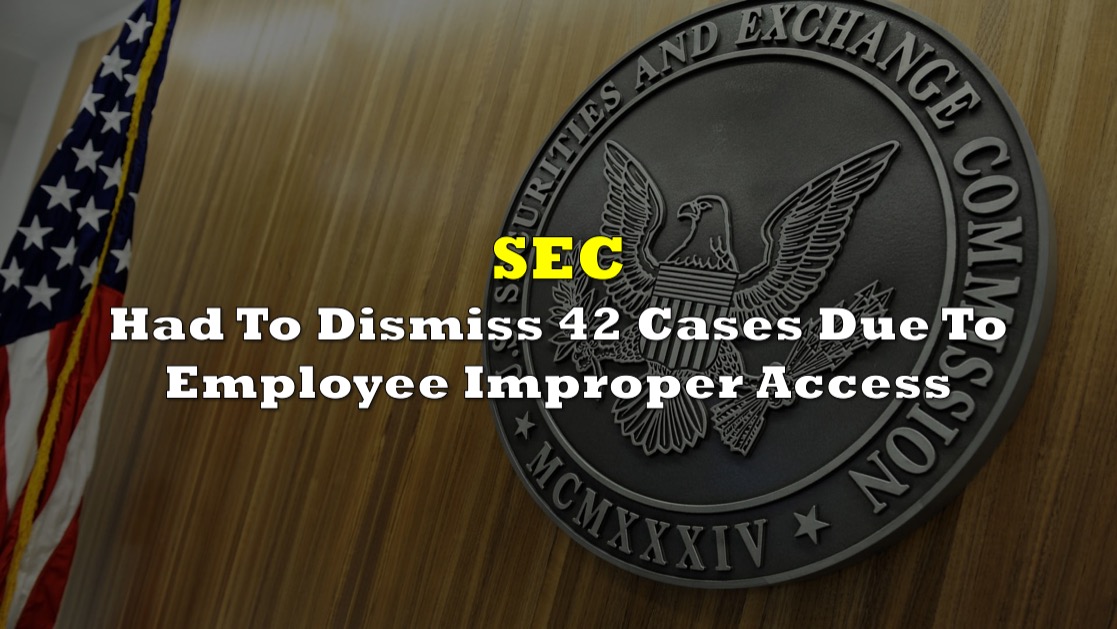In a stunning turn of events, the Securities and Exchange Commission (SEC) has decided to dismiss 42 enforcement cases after uncovering unauthorized access to legal records by some of its employees.
The decision comes after the SEC completed a protracted investigation into a problem that was first identified in April 2022, when it revealed that some of its systems had accidentally allowed SEC enforcement workers to read legal information intended for officials with its in-house court.
These dismissals primarily involve cases that were pending in the SEC’s in-house courts, which have long been a subject of controversy.
US SEC to dismiss 42 enforcement cases after an internal data mishap.
— unusual_whales (@unusual_whales) June 2, 2023
What happened: some of its databases had allowed SEC staff to view materials meant for officials with its in-house court.
An internal review found no evidence that the access effected any decisions made.
In such cases, the SEC’s enforcement and internal ruling arms are expected to be kept fully distinct from one another. The SEC apologized for the lapse and stated that it was dedicated to correcting it.
Despite the fact that the enforcement attorneys overseeing the cases were unaware of the restricted memos before using them as the basis for agency decisions, the SEC has chosen to drop the allegations. The primary motivation behind this decision is to conserve valuable resources, according to the agency.
The SEC also claimed the unauthorized access as “accidental,” as administrative personnel in its enforcement arm sought to track and collect all relevant files, but some databases were not adequately safeguarded to keep adjudication materials out. It went on to say that in most cases, the problematic materials were not made available to enforcement personnel until after a decision had been made.
According to SEC officials, an internal examination found no indication that the unauthorized access had any effect on judgments made by either enforcement staff or authorities assessing those matters.
Nonetheless, the agency opted to drop all ongoing proceedings, largely against people and small businesses affected by the unauthorized access. The SEC also stated that it has agreed to lift industry bans on 48 people who had petitioned the SEC for such relief and whose cases were similarly affected by the error.
Oops we made a boo boo..
— Free American Spirit (@FAmericanSpirit) June 3, 2023
Yes sure it was a mistake…https://t.co/vFi37TnrHm
The SEC, along with other independent agencies like the Federal Trade Commission, operates its own court systems to handle claims of misconduct made against businesses. These in-house courts, authorized by Congress several decades ago, have become a contentious issue, as defendants and an increasing number of corporations argue that they undermine the federal government’s separation of powers. Critics raise concerns that the SEC wields both judicial and prosecutorial powers through these courts.
Over the past decade, defendants have mounted legal challenges, many of which have been successful, against the SEC’s in-house courts. In 2018, the Supreme Court deemed the hiring process for SEC administrative law judges unconstitutional. Recently, in a landmark ruling, the high court affirmed that individuals and companies can challenge the constitutionality of an in-house trial in federal court. This decision has set the stage for a new wave of attacks against these special courts.
The SEC’s move to dismiss these enforcement cases has sent shockwaves through the financial world, as the implications of improper access to legal records and the future of in-house courts remain uncertain. The fallout from this revelation is likely to reverberate for some time, prompting calls for greater transparency and accountability within the SEC’s operations.
Information for this story was found via Reuters, The Wall Street Journal, and the sources mentioned. The author has no securities or affiliations related to the organizations discussed. Not a recommendation to buy or sell. Always do additional research and consult a professional before purchasing a security. The author holds no licenses.









